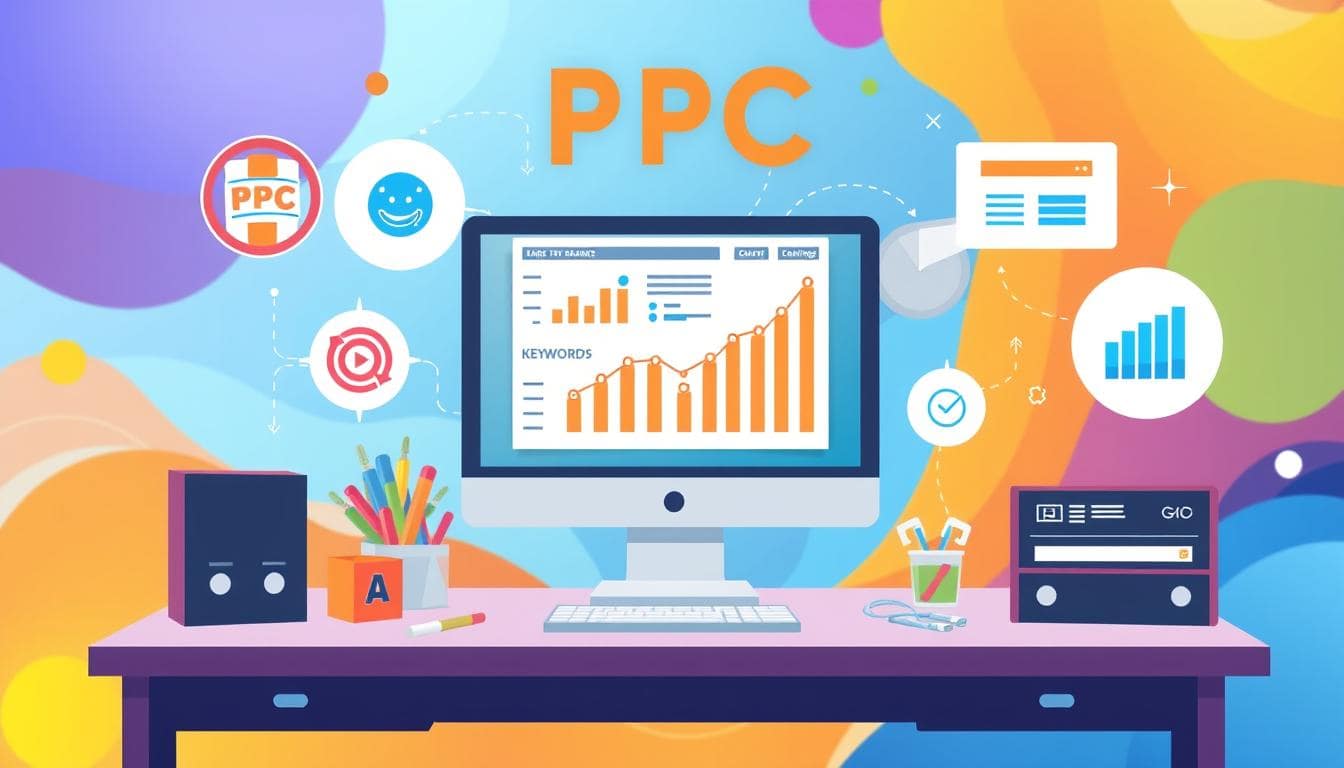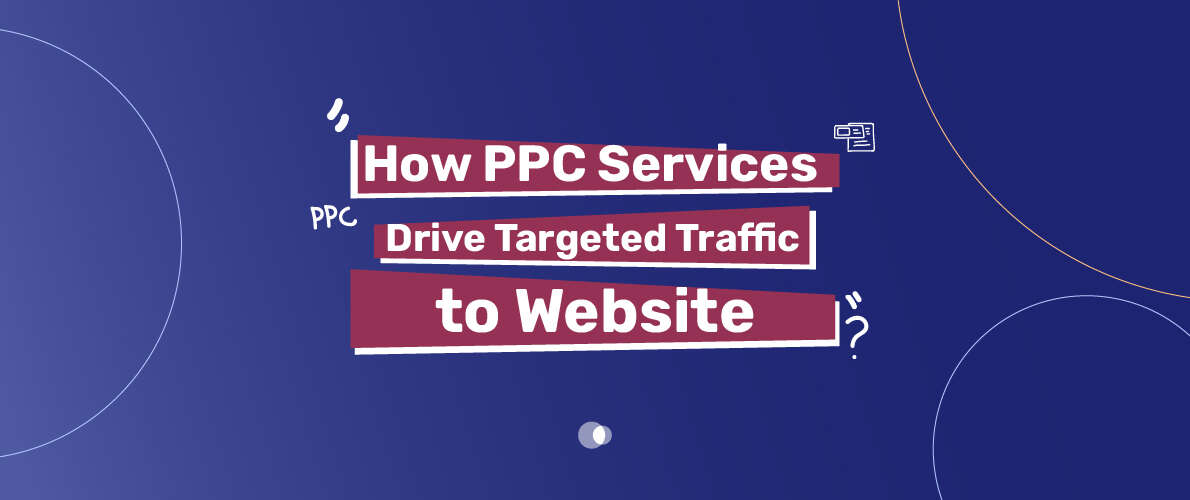In today’s digital world, getting the right people to visit your website is key. PPC Services Drive Targeted Traffic to Website, helping you connect with your ideal audience and generate quality leads. With the right PPC services, any business can grow and succeed online.
Table of Contents
PPC advertising means you pay for each ad click. It lets you target exactly who you want to reach. With PPC experts, you can make campaigns that bring in people ready to buy, boosting your sales and growth.

Key Takeaways
- PPC Services Drive Targeted Traffic to Website easily
- PPC services can help businesses of all sizes optimize their digital marketing strategies
- Effective PPC campaigns can generate qualified leads and drive valuable conversions
- PPC professionals can leverage advanced targeting and optimization techniques to maximize ROI
- Integrating PPC with other marketing channels can amplify your overall digital marketing success
Understanding the Fundamentals of Pay-Per-Click Advertising
Pay-per-click (PPC) advertising is a key tool in digital marketing. It helps businesses get more visitors to their websites. Platforms like Google Ads and Bing Ads let advertisers show ads to the right people. Knowing how PPC works is crucial for success.
Types of PPC Platforms Available
There are many PPC platforms, each with its own strengths. Some top ones are:
- Google Ads – The leader, with lots of ad types and targeting options.
- Bing Ads – Microsoft’s platform, reaching a different audience.
- Social media advertising – Facebook, Instagram, and LinkedIn offer PPC ads.
Basic PPC Terminology Every Marketer Should Know
Understanding PPC terms is key. Here are some important ones:
- Cost-per-click (CPC) – What an advertiser pays for each ad click.
- Ad auction – The bidding process for ad spots.
- Quality Score – How good an ad and landing page are.
How PPC Bidding Works
PPC bidding is at the core of PPC. Advertisers bid for ad spots. They set a max bid, the highest they’re willing to pay for a click. PPC platforms then choose the best ad based on quality, relevance, and bid.
Grasping these PPC basics helps marketers create better strategies. This leads to more website visitors and business success.
The Strategic Advantages of Professional PPC Services
Managing Google Ads management can be tough for many businesses. Professional PPC services offer a big help. They bring skills and experience that boost advertising ROI and optimization of campaigns.
PPC experts know the PPC world well. They keep up with new features and updates. This lets them use the latest trends and techniques to their advantage.
Another big plus is the time saved. PPC campaigns take a lot of work, from keyword research to tracking performance. Outsourcing to PPC experts means more time for other marketing tasks.
Lastly, PPC Services Drive Targeted Traffic to Websites using advanced tools for better insights. This data helps businesses make smarter choices, leading to improved advertising ROI over time.
| Advantage | Benefit |
| Expertise in PPC Trends and Best Practices | Ability to capitalize on the latest PPC techniques and optimize campaigns for maximum effectiveness |
| Time-Saving | Freeing up internal resources to focus on other critical marketing initiatives |
| Advanced Analytics and Reporting | Data-driven insights to make informed decisions and achieve better advertising ROI |
Working with expert PPC services gives businesses a big edge. It brings more targeted traffic to their site. This can lead to more sales and growth.
PPC Services Drive Targeted Traffic to Website
Pay-per-click (PPC) advertising is a powerful tool for online business promotion. It helps you reach your target audience with great precision. This ensures your marketing efforts are focused and bring a strong return on investment.
Audience Segmentation and Targeting
PPC lets you segment your audience by demographics, interests, and behaviors. This way, you can create ad campaigns that speak directly to your ideal customers. Understanding your audience targeting helps you craft messages that resonate with your target market, driving meaningful engagement.
Geographic and Demographic Targeting
PPC platforms offer advanced geo-targeting capabilities. You can target potential customers by their location, whether it’s a city, state, or radius around your store. This is especially beneficial for local businesses. You can also refine your targeting by age, gender, and income level.
Interest-Based Targeting Strategies
PPC services also allow targeting based on interests and behaviors. By using behavioral targeting, you can reach people who have shown interest in your products or services. This increases the chance of conversion and drives more qualified traffic to your website.
By using these advanced targeting capabilities, PPC services help you connect with your ideal audience. This drives high-quality traffic to your website, boosting your online visibility and driving business growth.
Creating High-Converting PPC Campaigns
Making successful pay-per-click (PPC) campaigns needs a smart plan. This includes improving ad copy and boosting conversion rates. By using A/B testing, marketers can tweak their ads and landing pages. This helps get more people engaged and converting.
Ad copy optimization is crucial. Great ad copy grabs attention and encourages clicks. Try out different headlines, descriptions, and calls-to-action to see what works best for your audience.
Conversion rate optimization is also key for landing pages. These pages should smoothly guide users to convert. They need clear offers, eye-catching visuals, and easy-to-use designs. A/B testing helps find the best page elements and layouts.
The key to a successful PPC campaign is to continuously test and optimize your ad copy and landing pages. Small tweaks can have a significant impact on your conversion rates.
Using data to guide PPC campaigns can greatly improve results. PPC Services Drive Targeted Traffic to Websites, and this approach drives more quality traffic and valuable conversions to your site.

| PPC Optimization Tactic | Impact on Campaign Performance |
| Ad Copy Optimization | Improved click-through rates and increased engagement with the brand’s messaging |
| Conversion Rate Optimization | Higher percentage of users completing the desired conversion actions |
| A/B Testing | Identification of the most effective ad and landing page elements, leading to ongoing improvements |
Optimizing Landing Pages for PPC Success
Making effective landing pages is key to a successful PPC campaign. These pages are where potential customers first see your offer. A well-designed landing page can greatly improve your conversion rates.
By focusing on landing page optimization, businesses can increase engagement and lead generation. This leads to better returns on investment from PPC ads.
Essential Landing Page Elements
Successful landing pages have a few important elements. They need a clear headline, a strong value proposition, and relevant visuals. The content should be short and easy to scan, with a clear call-to-action (CTA) button.
The layout should be user-friendly. It should meet the customer’s needs, making their experience smooth and intuitive.
A/B Testing for Maximum Conversion
Businesses should use A/B testing to improve landing page performance. This means creating different versions of a page to see which one works best. By testing various elements, like headlines and CTAs, marketers can find the most effective changes.
Mobile Optimization Techniques
- Make sure the page works well on mobile devices with a responsive design.
- Speed up page loading by compressing images and streamlining code.
- Keep the page simple by focusing on the most important elements.
- Use mobile-specific features to enhance the user experience.
Mastering landing page optimization can help businesses use PPC services more effectively. It drives targeted traffic, increases leads, and boosts conversion rates and user experience.
| Landing Page Element | Optimal Characteristics |
| Headline | Clear, concise, and attention-grabbing |
| Value Proposition | Clearly communicates the unique benefits to the user |
| Visuals | Relevant, high-quality, and visually appealing |
| Content | Scannable, informative, and aligned with user intent |
| Call-to-Action | Prominent, compelling, and drives the desired conversion |
Budget Management and ROI Tracking
Managing your PPC budget allocation and tracking return on investment (ROI) are key to a good PPC strategy. By smart budgeting and campaign analysis, you can get the most from your cost-per-click and cost-per-acquisition spending.
For PPC budgeting, finding the right balance is crucial, If you’re new to this, A Guide for New Marketers can provide valuable insights into how to allocate your budget effectively. Start with a budget that fits your marketing goals and industry competition. Keep an eye on your campaigns and shift more money to the best performers.
- Set a PPC budget that matches your marketing goals.
- Check and adjust your budget often to boost ROI.
- Use data to find the best ways to spend your PPC budget.
It’s vital to track your return on investment to see how well your PPC campaigns are doing. Use advanced analytics to watch metrics like click-through rate and conversion rate. This helps you see which ads and strategies work best and improve your PPC strategy.
“Effective PPC budget management and ROI tracking are the foundations of a thriving digital marketing strategy. Invest the time to understand your data and make data-driven decisions to drive maximum impact.”
A well-run PPC campaign brings in targeted traffic and a clear return on investment. By managing your budget well and keeping an eye on ROI, you can make the most of PPC services. This will help your business grow steadily.
Advanced PPC Analytics and Reporting
Diving into advanced PPC analytics and reporting opens up a world of insights. It can boost your marketing campaigns to new levels. By using PPC metrics, data analysis, and performance tracking, you can improve your campaign optimization strategies. This leads to unmatched success.
Key Performance Indicators (KPIs)
Finding the right KPIs is key to good PPC analytics. Metrics like click-through rates (CTR), conversion rates, cost-per-acquisition (CPA), and return on ad spend (ROAS) give a full view of your campaign’s performance. By watching these KPIs closely, you can make smart choices and make big changes.
Data Interpretation and Strategy Adjustment
The real strength of PPC analytics is in understanding and using the data to improve your strategies. By digging into the insights, you can spot trends, find problems, and adjust your campaigns. This cycle of using data to improve is how you grow and get the most from your PPC.
Custom Report Creation
While standard reporting tools are useful, creating custom reports is where the magic is. By making reports that fit your business needs, you can focus on the most important metrics. This level of detail lets you make better decisions and keep improving your PPC results.
“The true power of PPC analytics lies in the ability to interpret the data and utilize it to refine your strategies.”
Getting into advanced PPC analytics and reporting is a big step forward in your marketing journey. By using all the data available, you can make smart choices, optimize your campaigns, and take your online presence to new success levels.
Common PPC Mistakes to Avoid
Pay-per-click (PPC) advertising is a great way to get more people to visit your website. But, it comes with its own set of challenges. It’s important to avoid common PPC errors to make the most of your campaigns. Here, we’ll look at some common mistakes and how to avoid them.
One big mistake is picking the wrong keywords. Using the wrong keywords can hurt your ad quality scores and increase costs. To avoid this, do thorough keyword research. Focus on long-tail keywords that match what your audience is searching for.
Another mistake is not using negative keywords. Negative keywords help keep your ads from showing up for searches that aren’t relevant. It’s key to regularly check and update your negative keywords to keep your campaigns running smoothly.
- Make sure your ad copy is interesting and matches what users are searching for.
- Keep an eye on your ad quality score to save money and get more visibility.
- Always check how your campaigns are doing and make changes based on the data.
By avoiding these common PPC mistakes and using a strategic approach, you can make the most of PPC advertising. This will help you get more targeted and high-quality traffic to your website.
| Common PPC Mistakes | Impact on Campaign Performance | Strategies to Avoid Them |
| Poor keyword selection | Low ad quality scores, higher costs, and subpar performance | Conduct thorough keyword research, focus on long-tail, highly relevant keywords |
| Neglecting negative keywords | Wasted ad spend on irrelevant searches | Regularly review and update your negative keyword list |
| Weak ad copy | Low click-through rates and conversions | Ensure your ad copy is compelling and relevant to the user’s search query |
| Ignoring ad quality score optimization | Higher costs and reduced visibility | Continuously monitor and optimize your ad quality score |
| Lack of performance tracking and optimization | Missed opportunities for improvement and ROI maximization | Regularly review campaign performance and make data-driven adjustments |

The key to successful PPC advertising is to continuously test, optimize, and refine your campaigns. PPC Services Drive Targeted Traffic to Websites by leveraging data-driven insights to improve results and maximize ROI.
Integrating PPC with Other Marketing Channels
Today’s marketing needs a unified approach. Combining your pay-per-click (PPC) campaigns with other channels boosts your reach and engagement. This section will show how PPC works with social media, email, and content marketing to enhance your strategy.
Social Media Integration
Social media lets you connect with your audience and boost PPC results. By matching your social media and PPC ads, you create a strong brand image. This approach builds customer loyalty and increases conversions.
Email Marketing Synergy
Linking PPC with email marketing can change the game. Personalized emails to your PPC audience can nurture leads and bring back old customers. This strategy maximizes your marketing return and smooths out the customer journey.
Content Marketing Alignment
Pairing PPC with content marketing makes both channels more effective. Quality content that matches your PPC ads builds trust in your brand. It also boosts your search engine ranking and gives valuable info to your audience, leading to more qualified leads.
FAQs
What is pay-per-click (PPC) advertising?
PPC advertising is a way for businesses to pay for each ad click. It helps drive traffic to websites and can lead to sales or leads.
What are the different types of PPC platforms available?
Popular PPC platforms include advertise in google and Bing Ads. Social media platforms like Facebook Ads, Instagram Ads, and LinkedIn Ads are also used.
How does PPC bidding work?
In PPC bidding, you set a max amount for each ad click. The platform then decides which ads to show first based on your bid, ad quality, and relevance.
What are the strategic advantages of using professional PPC services?
Professional PPC services offer expertise in managing campaigns. They help with ad targeting and budgeting, improving your campaign’s ROI.
How PPC Services Drive Targeted Traffic to Website?
Professional PPC services offer expertise in managing campaigns. They help with ad targeting and budgeting, improving your campaign’s ROI.
What advanced PPC analytics and reporting capabilities are available?
Advanced analytics offer insights into key performance indicators. They help interpret data and create custom reports to improve campaign performance.
What are some common PPC mistakes to avoid?
Avoid poor keyword selection and neglecting negative keywords. Also, don’t ignore ad quality scores or performance data.
How can PPC be integrated with other marketing channels?
Effective budget management and ROI tracking are crucial. This includes monitoring cost-per-click and cost-per-acquisition to maximize campaign success.



